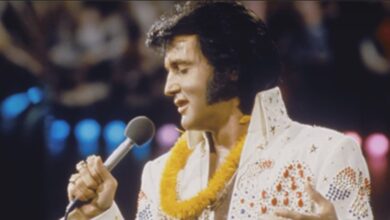We’ve Fallen in Love with Elvis All Over Again Through This Song—His Voice Has Mesmerized Us for 50 Years
Elvis Presley’s “Treat Me Nice” stands as a quintessential example of his early rock and roll prowess, encapsulating the spirit and energy of the era in which it was recorded. Released in 1957 as part of the soundtrack for the film “Jailhouse Rock,” the song was penned by the prolific songwriting duo Jerry Leiber and Mike Stoller, who were known for their ability to craft catchy, memorable hits. For Elvis, “Treat Me Nice” became more than just another track on an album; it became a staple in his repertoire, showcasing his ability to blend rockabilly rhythms with commanding vocals that exuded both charm and authority.
In “Treat Me Nice,” Elvis’s vocal delivery is characterized by its playful yet assertive tone, reflecting the song’s lyrics that emphasize the importance of mutual respect in relationships. This theme resonated deeply with audiences of the time, who were captivated by Elvis’s ability to convey both vulnerability and strength through his music. Backed by energetic guitar riffs, a solid bass line, and the driving force of D.J. Fontana’s drumming, the song’s arrangement underscored Elvis’s dynamic stage presence and magnetic charisma.
Beyond its chart success, “Treat Me Nice” played a pivotal role in Elvis’s career trajectory, particularly within the realm of performance. His live renditions of the song became showcases for his electrifying stage presence, where he would often interact playfully with the audience, reinforcing his reputation as a consummate entertainer. The song’s inclusion in “Jailhouse Rock,” a film that marked a significant milestone in Elvis’s transition from musician to movie star, further solidified its place in rock and roll history. The movie not only highlighted Elvis’s musical talents but also showcased his burgeoning acting skills, setting the stage for his dual career path in entertainment.
Born on January 8, 1935, in Tupelo, Mississippi, Elvis Aaron Presley rose to fame during the mid-1950s, becoming a cultural phenomenon known simply as the “King of Rock and Roll.” His unique blend of rockabilly, country, and rhythm and blues revolutionized popular music, influencing countless artists across genres. Elvis’s deep, resonant voice and charismatic stage presence set him apart, earning him adoration from fans worldwide and cementing his status as an icon of 20th-century music.
Despite his meteoric rise to fame, Elvis faced personal challenges, including struggles with addiction and health issues, which added layers of complexity to his public persona. However, his passion for music remained unwavering throughout his career. Songs like “Treat Me Nice” not only showcased his vocal range and musical versatility but also highlighted his ability to connect with audiences on a visceral level, leaving a lasting impact that transcends generations.
Elvis’s influence extends far beyond his chart-topping hits; it encompasses his cultural impact and enduring legacy in shaping the trajectory of popular music. From his groundbreaking performances on television, such as his electrifying appearances on “The Ed Sullivan Show,” to his record-breaking Las Vegas residencies, Elvis continually pushed the boundaries of what it meant to be a rock and roll star. His ability to evolve with the changing musical landscape ensured his relevance throughout his career, solidifying his place as one of the most significant figures in music history.
Today, Elvis Presley’s legacy continues to resonate with audiences worldwide. His contributions to rock and roll, combined with his charismatic persona and timeless recordings, ensure that his impact will endure for years to come. Whether through his early recordings at Sun Studio, his iconic performances in movies like “Blue Hawaii” and “Viva Las Vegas,” or his cultural influence that transcended music into fashion and film, Elvis Presley remains an enduring symbol of artistic innovation and cultural phenomenon.



